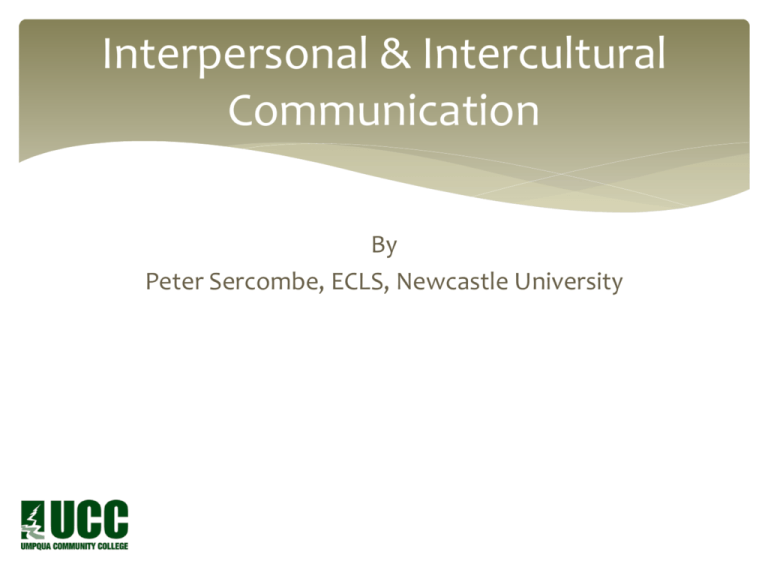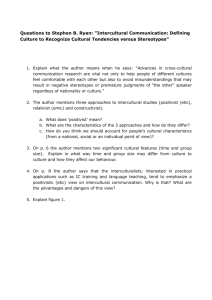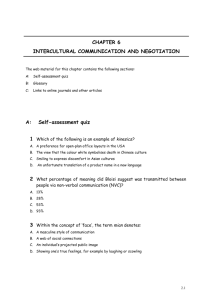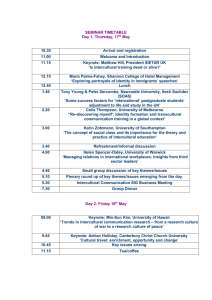Intercultural and Interpersonal Awareness Presentation
advertisement

Interpersonal & Intercultural Communication By Peter Sercombe, ECLS, Newcastle University Intercultural Communication Break down: http://youtu.be/M2z-HYnRTdQ http://youtu.be/PSt_op3fQck http://youtu.be/WXCvAX5Wl8w INTERCULTURAL AWARENESS WORKSHOP Culture Communication Cross- and Intercultural Communication Culture What does it mean? ‘Culture or civilisation, taken in its wide ethnographic sense, is that complex whole which includes knowledge, belief, art, morals, law, custom, and any other capabilities and habits acquired by man as a member of society’ (Tylor 1871: 1) Culture is an active process of meaning making and contest over definition … This then is what I mean by arguing that Culture is a verb (Street 1993: 25) ‘Culture in all its meanings and with all its affiliated concepts, is situational’ (Blommaert 1998: n.p.) Culture’s links with communication Communication creates culture: culture is a means of communication. Language carries culture, and culture carries, particularly through orature and literature, the entire body of values by which we come to perceive ourselves and our place in the world (Ngugi 1986: 15-16). Cross- and Intercultural Communication What do they mean? Cross-Cultural Communication (CCC) tends to compare patterns of communication and interactions across peoples from different cultural backgrounds (an ethnological position) Intercultural Communication (ICC) considers (interpersonal) communication which has the added characteristics of cultural ‘variance’ between those people involved, in one or more areas, such as: values, beliefs, thought patterns, practices (including language) and other habits of behaviour. Cultural variance can be salient in that it can create differing expectations and interpretations of interactions between people. [See Scollon & Scollon (2001: 13) for the distinction they make between ICC and CCC, as well as Gudykunst (2000: 314)] Is all communication intercultural? Discussion How would you define intercultural communication before? How would you define intercultural communication now? Do you have any other questions pertaining to intercultural communication? References / Sources Berge, K. L. (1994). Communication. In R. E. Asher, & J. M. Y. Simpson (eds) The Encyclopedia of Language and Linguistics. Oxford: Pergamon, pp. 614-620. • Birdwhistell, R. L. (1973). Kinesics. In Argyle, M. (ed.) Social Encounters. Harmondsworth: Penguin, pp. 93-102. • Blommaert, J. (1998). Different Approaches to Intercultural Communication: A Critical Survey. Plenary lecture, Lernen und Arbeiten in einer international vernetzten und multikulturellen Gesellschaft, Expertentagung Universität Bremen, Institut für Projektmanagement und Witschaftsinformatik (IPMI), 27-28 February. http://www.flwi.ugent.be/cie/CIE/blommaert1.htm • Gudykunst, W. B. (2000). Methodological issues in conducting theory-based cross-cultural research. In H. Spencer-Oatey (ed.) Culturally Speaking. Managing Rapport through Talk across Cultures. London: Continuum, pp. 293-315. • Kramsch, C. (2001). Intercultural Communication. In R. Carter & D. Nunan (eds) The Cambridge Guide to Teaching English to Speakers of Other Languages. Cambridge: Cambridge University Press. • Longman (1991). Longman Dictionary of the English Language. London: Longman. • Ngugi wa Thiong’o (1986). Decolonising the Mind: The Politics of Language in African Literature. London: James Currey. • Scollon, R. & Scollon, S. W. (2001). Intercultural Communication: A Discourse Approach. Oxford: Blackwell (2nd edition). • Shannon, C. & Weaver, W. (1949). The Mathematical Theory of Communication. Illinois: University of Illinois Press. • Street, B. (1993). Culture is a verb. In D. Graddol, L. Thompson and M. Byram (eds) Language and Culture. Clevedon: BAAL and Multilingual Matters, pp. 23-43. • Tylor, E. B. (1871). Primitive Culture: Researches into the Development of Mythology, Philosophy, Religion, Language, Art and Custom. New York: Henry Holt.






